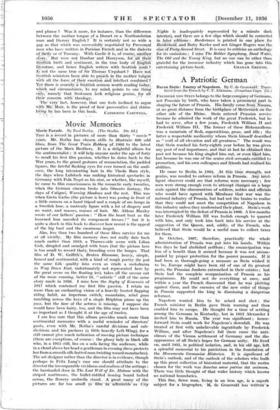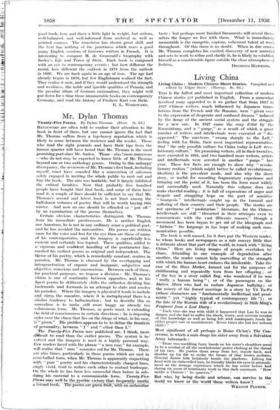A Patriotic German FREIHERR VON STEIN belongs to the large
company of Germans, not Prussian by birth, who have taken- a prigninent part in
shaping the future of Prussia. His fainily'eame,from Nassau, at no great distance from the birthplace Of Metternich on the other side of the Rhine. Stein entered Prussian service because he admired the work of the great Frederick, but he had to serve, after a few years, Frederick William II and Frederick William III. The former of these Hohenzollerns was a mountain of flesh, superstitious, gross, and idle ; the latter a respectable mediocrity whom Stein himself described as "void of all elevation and all greatness." The result was that Stein reached his forty-eighth year before he was given any post of real importance, and that last he obtained this post not because his king singled him out, or even lilcecl him, but because he was one of the senior, civil servants, entitled to promotion, and his own colleagues and friends had realised his abilities.
He came to Berlin, in ,1804.. At this time strength, not genius, was needed to enforce reform in Prussia. Anir intel-
ligent observer could ,see that reforms were necessary ; few men were strong enough even to attempt change i on a large scale against the obscurantism of soldiers, nobles and officials who would have agreed with Mirabeau that war was the national industry of Prussia, but had not the brains to realise that they could not meet the competition of Napoleon in this industry unless they modernised their plant. Stein's work was interrupted by the defeat of Prussia in 1800. A few months later Frederick William III was foolish enough to quarrel with him, and only took him back into his service at the suggestion of the Queen, and, oddly, of the French, who believed that Stein would be a useful man to collect taxes for them.
In October, 1807, therefore, practically the whole administration of Prussia was tout into his hands . Within five days he had abolished serfdom ; the emancipation was
less of a benefit than it seemed because it was not -aCeom- panied by proper protection for the poorer peasants If it
had. been as thorough-going a measure as Stein wished it to be, Europe might have been rid of one of its greatest pests, the Prussian Junkers entrenched in their estates ; but Stein had the complete reorganisation of Prussia as his programme. He could not do everything at once, and within a year the French discovered that he wai plotting
against them, and the enemies of the new order of things in Prussia supported the king in dismissing a dangerous reformer.
Napoleon wanted him to be seized and shot ; the French minister in Berlin gave Stein warning and thus enabled him to escape. He thought for a time of settling among the Germans in Kentucky, but in 1812 Alexander I invited him to Russia. The year was significant ; hence-
forward Stein could work for Napoleon's downfall. He was treated at first with unbelievable ingratitude by Frederick William, and after Napoleon's fall there came -the anti- climax of the Vienna settlement of Germany and the dis- appearance of all Stein' S hopes for German unity. He lived
on, until 1831, in political isolation, and, in his old age, left a splendid memorial to his patriotism in the foundation, of the Monuments Germaniae Historita. It is significant of Stein's outlook, and of the outlook of the scholars who built up this great collection of historical material, that the motto chosen for the work was amor patriae dal emimum. There was little thought of that wider history which knows no national boundaries.
This fine, fierce man,. living in an iron age, is a superb subject for a biographer. M. de Grunwald has writteff- a
Baron Stein: Enemy of Napoleon. By C. de Grunwald: Trans- late(' from the French by C. F. Atkinson. (Jonathan Cape: Its.) I -
good book, here and there a little light in weight, but serious, well-balanced, and well-informed from archival as well as printed sources. The translator has shown great skill, and the text has nothing of the jauntiness which mars a. good many English versions of histories written in French. -It is interesting to compare M. de Grunwald's' biography with Seeley's Life and Times of Skid. Each book is composed with an eye to contemporary events ; but .how different the moral, how different the outlook in 1878 from the outlook In 1930. We are back again in an age of iron. The age had already begun in 1878, but few.Englistunen realised the fact. They realise it now, and if they would understand the strength and weakness, the noble and ignoble qualities of Prussia, and the peculiar idiom of German nationalism, they might well put down for a time those innumerable books on contemporary Germany, and read the history of Freiherr Karl von Stein.
E. L. WOODWARD.

















































 Previous page
Previous page